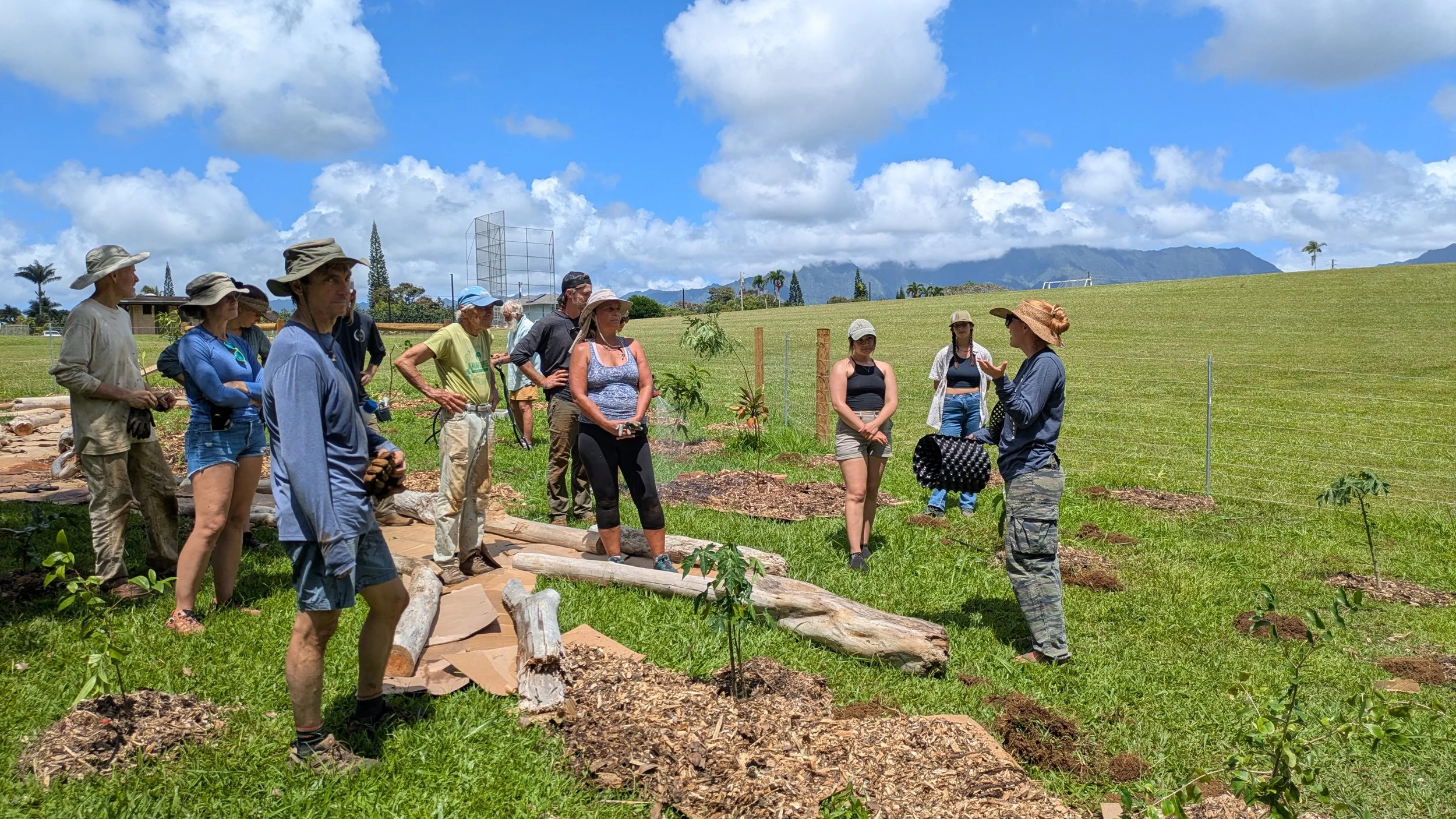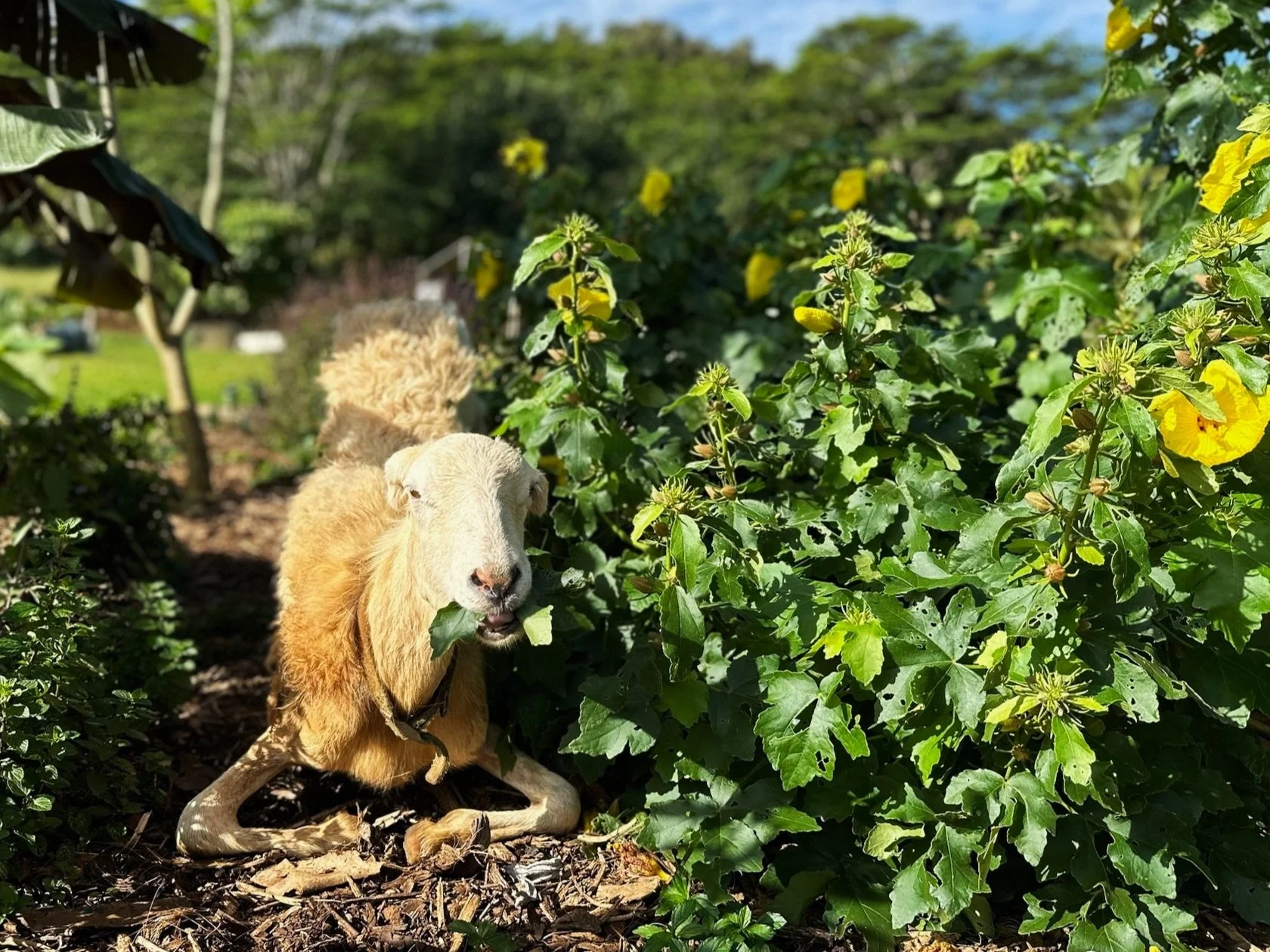
Māla Lāʻau (Forest Garden)
The Māla Lāʻau is more than a garden—it's a small, immersive forest designed to restore balance between people and place.
Current Projects
-

Wailua Homesteads Park
Community Forest Garden
Phase: Planting
-

Kauai Animal Education Farm
Community Forest Garden
Phase: Maintenance
-

West Side Kauai
Community Forest Garden
Phase: Community Outreach
Rooted in the principle that when we care for the ʻāina (land), it cares for us, Māla Lāʻau projects weave forest gardens into our daily lives, enhancing community well-being and environmental health.
A New Take on Forests
While traditional forest preserves are vital for conservation, they are often remote and require significant time and resources. The Māla Lāʻau brings the forest closer—pocket-sized, accessible, and seamlessly integrated into everyday life.
Inspired by Native Forests
Modeled after native Hawaiian forests, Māla Lāʻau gardens layer canopy trees, shrubs, and ground covers to create balanced ecosystems. Each layer works together to support biodiversity, manage water, and enrich the soil. Incorporating native plants and culturally significant species ensures these forest gardens reflect Hawaiʻi's heritage and community values.
Tailored for the Community
Each Māla Lāʻau is unique and designed to meet the specific history, needs, and environment of each location. The Māla Lāʻau offers a space where the community can gather, grow food, and reconnect with the ʻāina.
Benefits at a Glance
Food Security: Provides fresh, locally available food, reducing reliance on imports and increasing resilience during disruptions.
Restoring Ecosystems: Reintroduces native plants, restoring habitats and preserving cultural heritage.
Improving Soil and Water: Reduces runoff, retains moisture, and enriches soil health.
Fighting Climate Change: Trees and plants absorb carbon, purify the air, and provide cooling shade.
Strengthening Community: Creates spaces for connection, cultural learning, and shared purpose.
Why Māla Lāʻau Matters
Easy Access to Nature
By integrating Māla Lāʻau gardens into neighborhoods, residents can experience nature's profound mental and physical benefits without the barriers of transportation, cost, or time. These spaces help reduce stress, improve focus, and promote overall well-being.
A Classroom and a Refuge
The Māla Lāʻau serves as a puʻuhonua—a sanctuary for learning and healing. It is an open-air classroom for sustainability, ecology, and cultural traditions while offering safe habitats for native plants and wildlife.
Building Resilience
By capturing carbon, improving water quality, and increasing biodiversity, the Māla Lāʻau supports Kauaʻi's climate resilience. Its layered design naturally adapts to challenges like drought and pests, ensuring long-term sustainability.
Community-Driven
Over 83% of Kauaʻi survey respondents strongly support the Māla Lāʻau Project in Wailua Homesteads Park, highlighting shared values of sustainability, cultural preservation, and food security. This enthusiastic community backing has been instrumental in advancing the Māla Lāʻau at Wailua Homesteads Park. Designed as a space where people can grow, learn, and connect with the ʻāina, the Māla Lāʻau embodies the community's vision for a healthier, more resilient future.
-
Māla Lāʻau exemplifies sustainability by being self-sustaining and requiring minimal external inputs. This significantly reduces the need for synthetic fertilizers and pesticides, aligning with a more environmentally friendly approach to agriculture.
-
Māla Lāʻau provides a continuous source of fresh and diverse produce, ensuring local communities can access nutritious food. This food security is essential for resilient, self-reliant communities, reducing dependence on external food sources.
-
Māla Lāʻau goes beyond environmental stewardship; it is a living testament to cultural preservation.
This forest garden skillfully integrates indigenous knowledge and traditional farming practices. In doing so, it revitalizes and safeguards cultural heritage by illuminating the significance of these time-honored practices within the local community. This act of preservation reinforces the community's deep connection to its cultural roots.
Māla Lāʻau stands as a dynamic celebration of traditional farming practices. It pays homage to the indigenous knowledge and practices passed down through generations, ensuring that the rich tapestry of cultural history continues to thrive within the community.
-
Planting new forests in urban areas significantly decreases the urban heat island effect. Māla Lāʻau's presence helps cool urban heat islands by up to 20 degrees, reduces harmful ozone levels, and supports communities most affected by climate change and urban heat islands. This has a direct positive impact on the well-being and comfort of urban residents.
-
As a forest garden, Māla Lāʻau serves a dual role in combating climate change. The plants actively absorb carbon dioxide as they grow, transforming it into life-sustaining oxygen. This not only acts as a carbon sink, like natural forests, mitigating the effects of climate change but also reduces greenhouse gas levels in our atmosphere, making it a powerful tool in the fight against climate change.
-
Māla Lāʻau is a sanctuary for both plant and animal life. Planting diverse native plant communities provides essential habitats for local wildlife and promotes the health and well-being of various species. This harmonious balance ensures the functioning of a diverse and resilient ecosystem, contributing to local wildlife conservation and enhancing biodiversity.
-
The Māla Lāʻau, the secret to thriving soil health, lies within its lush biodiversity. The rich tapestry of plant species, their organic matter, and intricate root systems create a haven for beneficial microorganisms. These tiny yet essential soil dwellers tirelessly work to break down organic matter, enriching the soil with vital nutrients. This dynamic system is the cornerstone of soil health and resilience, contributing to the sustainability and vibrancy of the entire Māla Lāʻau project. Additionally, Māla Lāʻau is a champion of soil regeneration. One of its remarkable features is the reduction of surface runoff, which typically washes away valuable topsoil and pollutants into our water bodies. By capturing and slowing the flow of rainwater, this forest garden plays a crucial role in preserving our soil's health, preventing degradation, and ensuring the purity of our natural water resources.
-
Spending time in natural environments, like Māla Lāʻau, offers extensive health benefits to individuals, regardless of their socioeconomic status, health condition, or ethnic background. The positive health outcomes include mental well-being, stress reduction, and improved health. By creating spaces for people to connect with nature, Māla Lāʻau contributes to the health and vitality of the local community.
-
Māla Lāʻau plays a pivotal role in responsible water management, ensuring the local ecosystem thrives.
Our diverse plant communities, which include deep-rooted trees and shrubs, act as natural sponges. They allow rainwater to infiltrate the soil, enhancing water absorption. This not only reduces the risk of flooding and soil erosion but also fosters a more stable and resilient landscape.
Through the process of water absorption and natural filtration, Māla Lāʻau contributes to the recharge of aquifers. These underground water reservoirs are essential freshwater sources, especially in regions with limited water resources. The project indirectly helps maintain a sustainable and reliable water supply for local communities.
Furthermore, Māla Lāʻau significantly reduces surface runoff, where rainfall flows over the ground surface, often carrying pollutants into rivers and oceans. By capturing and slowing the movement of rainwater, the forest garden minimizes the adverse effects of runoff, such as soil degradation and contamination of natural water bodies. This comprehensive approach to water stewardship ensures a healthier environment and cleaner water for all.
-
Māla Lāʻau excels in enhancing the local community's water and air quality.
The forest garden serves as a natural filter for rainwater. As water percolates through the soil, it undergoes filtration, effectively removing impurities and pollutants. This process significantly improves water quality, ensuring local water sources remain uncontaminated and providing access to cleaner, healthier water.
Māla Lāʻau is a robust air quality enhancer. The diverse vegetation within the forest garden adeptly captures airborne pollutants, including particulate matter and gases. This results in cleaner, fresher air for the surrounding community, offering respiratory health benefits and contributing to an overall improvement in air quality. This dual-action approach safeguards the environment and the well-being of all who call it home.
-
Māla Lāʻau stands as a beacon of resilience, bolstering communities against the effects of climate change.
This forest garden is a vital tool in strengthening the resilience of communities, particularly those most susceptible to climate change impacts. Its multifaceted approach diminishes the vulnerabilities experienced by these communities, ultimately improving overall well-being.
Moreover, Māla Lāʻau embodies long-term resilience. Its self-sustaining nature ensures that ecosystems and communities endure and thrive under external pressures and environmental fluctuations. By reducing dependence on external inputs and championing sustainable practices, this garden empowers communities to weather shocks and adapt to changing conditions with confidence.
-
Aesthetic & Recreational Value
Beyond their ecological functions, forest gardens add aesthetic beauty to the landscape. The lush greenery, vibrant flowers, and diverse plant life provide a scenic and tranquil environment. This aesthetic appeal enriches the quality of life for the local community, and the gardens can serve as recreational spaces for relaxation and leisure.
Community Building
The collaborative nature of Māla Lāʻau fosters community building. It brings people together to work on a shared project, strengthening social bonds and enhancing the sense of belonging. The garden is a focal point for community gatherings and events, further promoting social cohesion.
Empowerment
The project empowers community by involving them in decision-making and enabling them to become stewards of their natural surroundings. Through Māla Lāʻau, communities have the agency to take positive steps towards environmental sustainability, ultimately leading to greater environmental justice and equity.
-
Climate Equity
Māla Lāʻau is a symbol of climate equity. Creating small-scale pocket forest gardens and implementing sustainable land management practices ensures that the benefits of a healthier environment are accessible to all members of the community, irrespective of socioeconomic factors. This promotes equity in addressing the effects of climate change, ensuring that marginalized and vulnerable populations are not disproportionately affected.
Environmental Justice
Māla Lāʻau plays a vital role in environmental justice. It provides communities, particularly those historically underserved, access to green spaces, cleaner air, and fresh, locally grown food. Reducing pollution, mitigating urban heat islands, and enhancing biodiversity directly contribute to rectifying past environmental injustices. It fosters more equitable access to a healthier environment.
Inclusivity & Diversity
Māla Lāʻau promotes inclusivity and diversity by welcoming individuals from all backgrounds to participate in its activities. This diversity enriches the garden and underlines the importance of inclusivity and equity within sustainable land management.
-
Māla Lāʻau is an educational platform for the local community and visitors. It allows people of all ages to learn about sustainable land management, native plant species, and traditional agricultural practices. This educational aspect fosters a deeper connection to nature and promotes environmental awareness and stewardship.
How will you incorporate the Māla Lāʻau (Forest Garden) into your life?
-
Māla Lāʻau (forest gardens) embody traditional land stewardship, providing food, medicine, and comfort while sustaining ʻāina. Like native forests, they thrive with minimal care, relying on layered plant systems rooted in native species. This approach offers a simple, sustainable way to nourish people and place.
Our Current Projects
New! Suggest a location for the next Māla Lāʻau: Click Here…
-
Understory Alliance offers hands-on learning experiences that remind us we are nature—not separate from it. Learn More about Our Education Programs…
-
Native Plant and Seed Sales coming soon!
Store -
Biocultural Conservation Landscape Design and Consultation. Our specialized team is passionate about creating and restoring landscapes that are not only ecologically sustainable but also culturally significant. Read More…
Suggest a Location
Interested in a Mala Laʻau in your Community? Fill out some info and we will be in touch shortly! We can't wait to hear from you!



